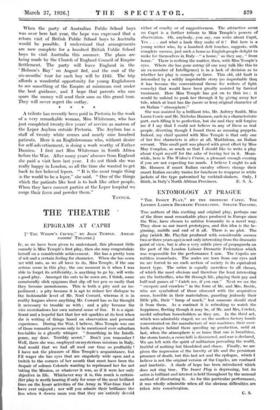THE THEATRE '
EPIGRAMS AT CAPRI [" THE WIDOW'S CRUISE," BY JOAN TEMPLE. AMBAS- SADORS' THEATRE.] IF, as we have been given to understand, this pleasant little comedy is Miss Temple's first play, then she may congratulate herself on a considerable achievement. She has a pretty turn a wit and a certain feeling for character. When she has sown her wild oats, as we all have to do, Miss Temple, if the one serious scene in this play, the one moment in it when I was able to forget its artificiality, is anything to go by, will write a good play. Amongst the oats to be sown are, I think, some unnaturally slick epigrams that slip off her pen so easily that they become monotonous. This is both a pity and an im- pediment ; a pity because it is apt to reduce her dialogue to „the fashionable level of Mr. Noel Coward, whereas it is in reality leagues above anything Mr. Coward has so far thought it necessary to trouble us with ; and a pity because the vice overshadows her own natural sense of fun. It is a signi- ficant and a hopeful fact that her wit sparkles at its best when she is writing of things based on observation and personal experience. During the War, I believe, Miss Temple was one of those romantic persons only to be mentioned over suburban tea-tables in a ghostly whisper. " Something .in the Intelli- gence, my dear. Terribly secret." Don't you remember ? Well, there she was, employed on mysterious missions in Italy. And would that we had all used our time so profitably I I have not the pleasure of Miss Temple's acquaintance, but I'll wager she has eyes that are singularly wide open and a twitch to the corners of her mouth that must have been the despair of solemn Colonels wanting to reprimand her for not taking the Mission, or whatever it was, as if it were her only Dbjective in life. Whichever way it is, this much is certain. . Her play is worth hearing if only for some of the most brilliant lines on the lesser activities of the Army in War-time that I have ever enjoyed ; nor will you admire their brilliance the less when it dawns upon you that they are entirely devoid
either of cruelty or of suggestiveness. The attractive scene on Capri is a further tribute to Miss Temple's powers of observation. Oh, anybody, you say, can write about Capri.
Yes . . . and what a hash they make of it ! But here is a young writer who, by a hundred deft touches, suggests, with complete success, just such a home as English people delight to make for themselves in Italy—" a home," as they say, " from home." There is nothing the matter, then, with Miss Temple's eyes. Where she has gone astray (if one may talk like this to an ex-member of Intelligence) is in a lack of decision as to whether her play is comedy or farce. This old, old fault is intensified by a wildly improbable story (so improbable that it has become the conventional theme for writers of light comedy) that would have been greatly assisted by farcical treatment. Here Miss Temple has got on to thin ice ; it would be unkind to push her through it by giving away her tale, which at least has the (more or less) original character of an Italian " atmosphere."
She was assisted by a brilliant trio, Mr. Aubrey Smith, Miss Laura Cowie and Mr. Nicholas Hannen, each in a characteristic part, each filling it to perfection, but she and they will forgive me if I say that I could not believe in any of them as real people, diverting though I found therri as amusing puppets. Indeed, my chief quarrel with Miss Temple is that only one of her five characters is alive at all, Maddalena, an Italian servant. This small part was played with great effect by Miss May Congdon, so much so that I should like to write a play about Capri myself for the sake of having her in it. Mean- while, here is The Widow's Cruise, a pleasant enough evening if you. are not expecting too much. I believe I ought to, ask Mr. Hannen if smart Italian cavalry officers change their smart Italian cavalry tunics for luncheon to reappear in white jackets of the type patronized by cocktail-shakers. Only, I
think, in Italy's North African Provinces. E. S. A.






















































 Previous page
Previous page